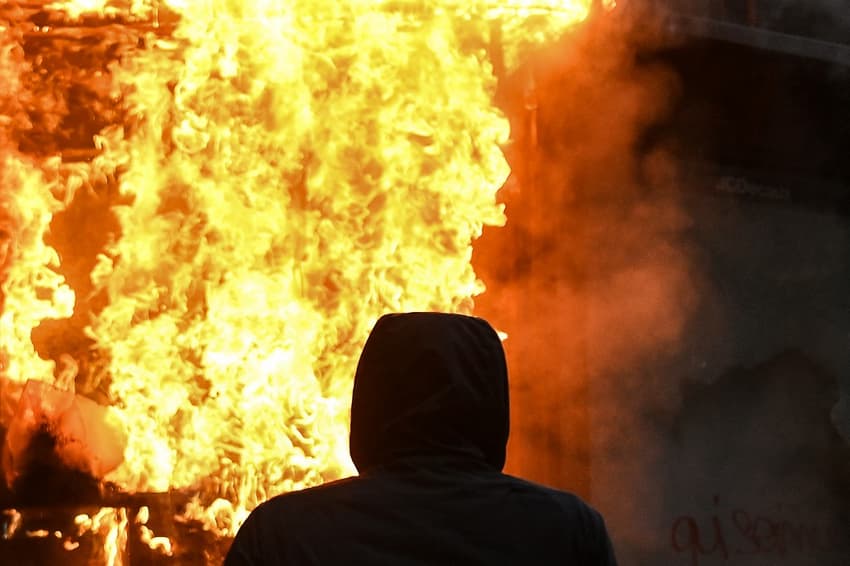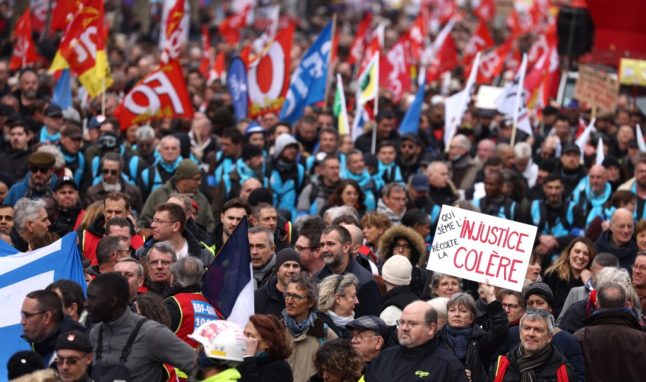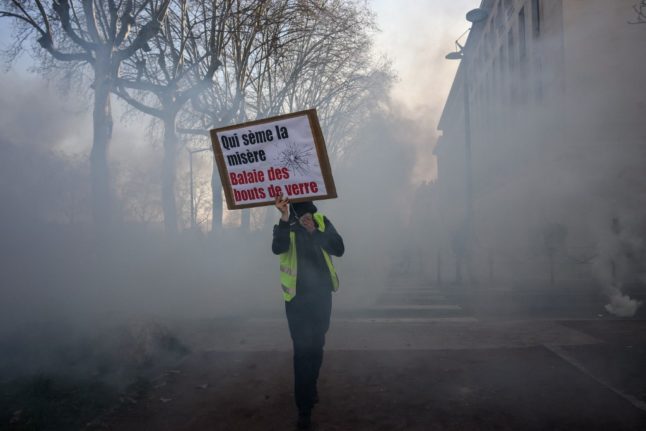Is France facing a rerun of the 'yellow vest' protests?

French President Emmanuel Macron's move to force through his pension reform by short-circuiting parliament may well rekindle social unrest reminiscent of the Yellow Vest movement, experts have warned.
Protests against the government's use of a special constitutional provision, known as article 49.3, to sweep aside parliamentary opposition to the reform have been angrier than anything seen over the past two months.
Since the article was used last Thursday, France - and especially Paris - has seen trouble flare nightly, with small groups of black-clad demonstrators smashing windows and setting fires.
Thursday, March 23rd saw another day of nationwide strikes and protests that ended in violent clashes in Paris, Bordeaux and Rennes. In Bordeaux a fire was lit at the town hall.
In total 457 people were arrested and 441 police officers injured, according to Interior Minister Gérald Darmanin.
Unions, united in coordinating their protests, have called for a tenth strike day on Tuesday, March 28th, but many expressed fears they could lose control of the protests as more radical demonstrators set the tone.
"Yes, we are worried," Cyril Chabanier, the head of the moderate CFTC union, told AFP.
Commentators have begun to wonder whether the hardening of fronts could herald the return of the Yellow Vests, a grassroots movement that started in 2018 as a protest against rising fuel prices.
It snowballed into the biggest social action against Macron in his first term, the protests often marked by clashes with security forces and damage to property.
"It's a social law of physics," said Jean-Marie Pernot, a political scientist specialising in trade unions.
"If you don't respect any of the channels meant for the expression of dissent, it will find a way to express itself directly," he told AFP.

Protesters march through Paris during a demonstration against the government's proposed pensions overhaul on March 15th, 2023. Photo by Thomas SAMSON / AFP
Early Yellow Vest action was marked by strikes, weekly demonstrations, the blocking of roads and fuel depots, and the worst clashes with riot police in decades.
The weekly Saturday protests continued for months before gradually fizzling out - losing momentum after Macron agreed to many of their demands.
'Tougher action ahead'
"There may be tougher action ahead, more serious and further-reaching," warned Fabrice Coudour, a leading energy sector representative for the hard-left CGT Union.
"It may well escape our collective decision-making," he said.
The Yellow Vests prided themselves on having no designated leaders. They resisted attempts by left-wing politicians and unions to harness the movement's energy for their own ends.
READ ALSO: 'Two fingers to the French people' - what the papers said about Macron's pension decision
But one of their more prominent spokesmen was Jerome Rodrigues, who lost an eye to a police rubber bullet during clashes at one demo.
Within hours of Macron's pensions move on Thursday, Rodrigues told an angry, cheering crowd outside the National Assembly that the objective was now nothing less than "the defeat" of the president.
At the same time, protests erupted in many parts of France, some demonstrators destroying street furniture, smashing windows and setting bins on fire.
Those protests continued on a smaller scale through the week, before the serious violence on Thursday night.

A man holds a placard reading “who sows misery, sweeps away pieces of glass" as demonstrators clash with policemen in Lyon during protests against the government's planned pensions reform. Photo by Jeff PACHOUD / AFP
The unions have already put the responsibility for any future trouble at the government's doorstep.
READ ALSO: Calendar: The latest French pension strike dates to remember
"Obviously, when there is this much anger and so many French people on the streets, the more radical elements take the floor," said Laurent Escure, boss of the UNSA trade union federation.
"This is not what we want, but it's going to happen. And it will be entirely the government's fault," he told AFP.
For weeks, Laurent Berger, head of the moderate CFDT union, has been warning the government that there could be more trouble if protesters got the idea that the Yellow Vests achieved more with violence than established unions with their recent, mostly peaceful, mass demonstrations.
"What is the democratic outlook for a country that fails to respond to 1.5 or 2 million people in the streets on three occasions, but that did respond to a violent movement with a fifth of that number in the street?" he asked in an interview last month.
Macron made a number of concessions to the Yellow Vest movement.
Among other measures, he scrapped a planned carbon tax and boosted salaries for minimum wage earners, for a total estimated cost to public finances of €10 billion.
Comments
See Also
Protests against the government's use of a special constitutional provision, known as article 49.3, to sweep aside parliamentary opposition to the reform have been angrier than anything seen over the past two months.
Since the article was used last Thursday, France - and especially Paris - has seen trouble flare nightly, with small groups of black-clad demonstrators smashing windows and setting fires.
Thursday, March 23rd saw another day of nationwide strikes and protests that ended in violent clashes in Paris, Bordeaux and Rennes. In Bordeaux a fire was lit at the town hall.
In total 457 people were arrested and 441 police officers injured, according to Interior Minister Gérald Darmanin.
Unions, united in coordinating their protests, have called for a tenth strike day on Tuesday, March 28th, but many expressed fears they could lose control of the protests as more radical demonstrators set the tone.
"Yes, we are worried," Cyril Chabanier, the head of the moderate CFTC union, told AFP.
Commentators have begun to wonder whether the hardening of fronts could herald the return of the Yellow Vests, a grassroots movement that started in 2018 as a protest against rising fuel prices.
It snowballed into the biggest social action against Macron in his first term, the protests often marked by clashes with security forces and damage to property.
"It's a social law of physics," said Jean-Marie Pernot, a political scientist specialising in trade unions.
"If you don't respect any of the channels meant for the expression of dissent, it will find a way to express itself directly," he told AFP.

Early Yellow Vest action was marked by strikes, weekly demonstrations, the blocking of roads and fuel depots, and the worst clashes with riot police in decades.
The weekly Saturday protests continued for months before gradually fizzling out - losing momentum after Macron agreed to many of their demands.
'Tougher action ahead'
"There may be tougher action ahead, more serious and further-reaching," warned Fabrice Coudour, a leading energy sector representative for the hard-left CGT Union.
"It may well escape our collective decision-making," he said.
The Yellow Vests prided themselves on having no designated leaders. They resisted attempts by left-wing politicians and unions to harness the movement's energy for their own ends.
READ ALSO: 'Two fingers to the French people' - what the papers said about Macron's pension decision
But one of their more prominent spokesmen was Jerome Rodrigues, who lost an eye to a police rubber bullet during clashes at one demo.
Within hours of Macron's pensions move on Thursday, Rodrigues told an angry, cheering crowd outside the National Assembly that the objective was now nothing less than "the defeat" of the president.
At the same time, protests erupted in many parts of France, some demonstrators destroying street furniture, smashing windows and setting bins on fire.
Those protests continued on a smaller scale through the week, before the serious violence on Thursday night.

The unions have already put the responsibility for any future trouble at the government's doorstep.
READ ALSO: Calendar: The latest French pension strike dates to remember
"Obviously, when there is this much anger and so many French people on the streets, the more radical elements take the floor," said Laurent Escure, boss of the UNSA trade union federation.
"This is not what we want, but it's going to happen. And it will be entirely the government's fault," he told AFP.
For weeks, Laurent Berger, head of the moderate CFDT union, has been warning the government that there could be more trouble if protesters got the idea that the Yellow Vests achieved more with violence than established unions with their recent, mostly peaceful, mass demonstrations.
"What is the democratic outlook for a country that fails to respond to 1.5 or 2 million people in the streets on three occasions, but that did respond to a violent movement with a fifth of that number in the street?" he asked in an interview last month.
Macron made a number of concessions to the Yellow Vest movement.
Among other measures, he scrapped a planned carbon tax and boosted salaries for minimum wage earners, for a total estimated cost to public finances of €10 billion.
Join the conversation in our comments section below. Share your own views and experience and if you have a question or suggestion for our journalists then email us at [email protected].
Please keep comments civil, constructive and on topic – and make sure to read our terms of use before getting involved.
Please log in here to leave a comment.